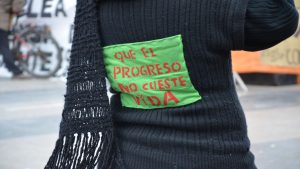The sexist and discriminatory comments of Baby Etchecopar said in its radio program “The Angel of the Midday” on Radio 10, generated a great repudiation of social movements and women, from which several complaints were filed, including a criminal violate the national law 23.592 that penalizes discriminatory acts. The regulation imposes a penalty of imprisonment of one to three years to those who make propaganda based on ideals or theories of superiority of a group of people.
“Below, we offer a google translate version of the original article in Spanish. This translation may not be accurate but serves as a general presentation of the article. For more accurate information, please switch to the Spanish version of the website. In addition, feel free to directly contact in English the person mentioned at the bottom of this article with regards to this topic”
In virtue of the acts of Mediaeval and Symbolic Violence against women generated by the comments of Etchecopar, from the FUNDEPS Gender Team we filed a complaint with the National Communications Agency (ENACOM), in repudiation for the dissemination of these messages that promote discrimination against women, legitimizing inequality of treatment and reproducing sociocultural patterns of inequality and generators of violence against women.
The misogynistic sayings that motivated our denunciation took place on September 10 as part of a telephone discussion with Silvia Ponce, leader of the Evita movement, who was in a social protest against the adjustment and economic policies of the Mauricio Macri government.
In this context, the radio operator asked her if she was a beneficiary of a social plan, to which she replied that she did. So he asked her if she worked. When Silvia answered affirmatively again and said that she worked every day at home, Mr. Baby Etchecopar interrupted her saying: “No no, but not at home. You answer me what I ask you because cassette no. Do you work or do not you work? ”
We consider that such an expression is totally discriminatory, sexist and that it makes the work of women invisible, since domestic activity is work, even if it is not remunerated. In fact, it is one of the main causes of inequality between men and women.
According to INDEC data, 9 out of 10 women dedicate part of their day to this type of tasks, which includes the care and maintenance of the home. Also, 76% of unpaid domestic jobs in Argentina are performed by women. Even those who work full time dedicate more time in their life to these activities than men who are unemployed. This fact implies less leisure time for women, training and professional development. Which translates into lower income, more precarious work and the so-called “glass ceiling” that prevents us from accessing the hierarchical positions of power.
Lastly, after taking Leader Silvia Ponce out of the air, Baby Etchecopar said: “I have six children. Who sends you to fuck, boluda? Stop fucking. ” We repudiate such expression not only by the level of aggression, but by setting a clear example of gender violence: and according to the Law of Integral Protection of Women 26,485, as media violence, understood as “all publication or dissemination of messages and images stereotyped through any mass media, that directly or indirectly promotes the exploitation of women, insults, defames, discriminates, dishonors, humiliates or threatens the dignity of women and legitimizes the inequality of treatment or builds socio-cultural reproductive patterns of the inequality or generators of violence against women “.
Baby Etchecopar with his sayings endorses and replicates the models of domination and protection over the woman’s body.
For these same facts that generated our complaint is that the Criminal Prosecutor, Contravencional and Faltas 18, specialized in Gender Violence of the Autonomous City of Buenos Aires, in charge of Federico Villalba Díaz interim, decided to impute it for discrimination in the context of violence of gender.
The prosecution requested the intervention of the Ombudsman’s Office and the National Institute against Discrimination, Xenophobia and Racism (INADI). In turn, the National Communications Agency (ENACOM) also initiated a summary against Etchecopar to determine if Law 26,522 was violated, which seeks to prevent gender violence and protect the most vulnerable audiences.
The media has an undeniable responsibility in the construction of citizenship, since they are not only opinion makers, but also endorse and legitimize practices of society. We welcome the intervention of these institutions in this case and we continue to demand full compliance with and respect for the laws that protect women in order to continue building a more egalitarian society.
Author:
Valentina Montero
Contact:
Virginia Pedraza




